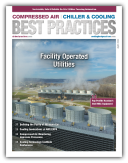Good morning. How is business in Western Canada?
Good morning! Business is very strong in both the oil exploration market and with standard industry here. Alberta has the second largest oil reserves in the world - when you include the tar sands. We have over 90,000 Americans living in Calgary-due to the oil industry. All major oil exploration companies and engineering firms have offices in Calgary. The fact that these engineering centers are located here has also allowed Northwest Equipment to get involved with a significant amount of packaging for international projects.
The “rooftop” industrial market is also growing due to the rising cost of electricity here. The energy industry was deregulated at the beginning of 1996 and electricity costs for industry have risen since then from two (2) cents per kwh to nine (9) cents per kwh! This has created an environment where industry is looking for ways to reduce energy costs.
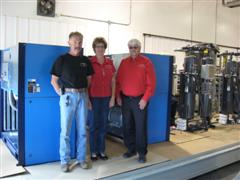 |
||
| Jim Wood, Patti Van Der Meer, and Sid Van der Meer (owners) of Northwest Equipment |
How was Northwest Equipment started?
In June of 2000, two partners and I (Mr.Van der Meer) started Northwest Equipment here in Alberta. We were a total of four people and had our offices in Calgary. In 2003, we acquired the Compressed Air Division of Brittania Compressor Sales. I had been a sales person and partner at Brittania from 1979 to 1997. Brittania wanted to focus on the oil drilling business and we are 100% focused on compressed air systems. The acquisition was good for both companies.
Our slogan is “Total Compressed Air Solutions”. We prefer the customer give us their application and then we will find the best solution for them. This philosophy has worked well for us. Northwest Equipment grew 30% per year between 2000 to 2005. This rapid growth led us to move to a new facility in Airdrie, Alberta. We now employ 34 people and operate a 12,500 square foot facility sitting on 1.6 acres. The facility gives us the ability to fabricate customized packages for our customers. It is also a full service shop where we can overhaul and service air compressors.
| Northwest Equipment Headquarters in Airdrie, Alberta |
Please describe your oil-field instrument air packages.
Compressed air, in the oil-field, is used for instrument air. Most control valves and actuators, in the oil and gas industry, are air operated. The design specifications call for unmanned compressed air systems. Due to the low ambient temperatures here, the compressed air must be dry air with pressure dewpoints to -40 F (-40 C). Some installations will also specify a -100 F (-73 C) dewpoint.
When they build a gas plant or a oil-field facility, they want a self-contained building for the compressed air system. Northwest Equipment fabricates turn-key buildings for this industry. The building has full electrical capabilities with a main power supply, lighting, heating, and full insulation of the skid. All the customer has to do is connect the skids to the steel pilings underneath and connect power to the building.
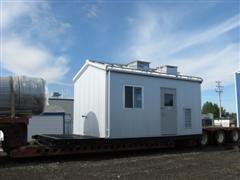 |
||
| A Turn-key Compressed Air Building leaves for the oil fields. |
We provide the buildings with thermostatic climate control. We need enough ventilation in the summer and heat control during the winter using heaters. Most of the skids underneath the building have holding tanks where all the oily condensate goes. A vacuum truck comes to the building site and collects the oils to then dispose of them properly. Alberta has strong “Green Initiatives” and oily condensate cannot be dumped into the ground.
These compressed air packages will have two air compressors, a wet air receiver, and a regenerative desiccant air dryer. We use reciprocating, rotary vane and rotary screw air compressors and always have built-in redundancy. If one air compressor goes down, they can start the second one. Depending upon the air compressor application, we will sometimes use a VFD package. The system is operated by a PLC controller, which is tied into the customers’ remote DCS system. In this manner the customer maintains full operational control of the air compressors from a remote location.
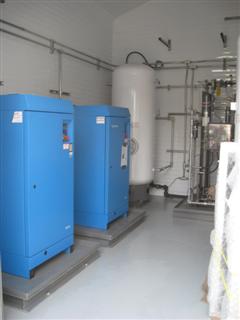 |
||
| This building contains redundant rotary vane air compressors, a wet air receiver, and a regenerative desiccant dryer – all under a PLC controller for remote control. |
Over the years we have also seen natural gas used instead of compressed air to run the instruments. Many installations use “instrument gas”, dry it, and then run valves off of the natural gas. The problem with “instrument gas” is that now you are not allowed to vent the excess gas or flare it. There is therefore a big push to go back to compressed air for instruments.
Please describe your service department.
Ninety-five percent (95%) of the air compressors we sell get a Preventative Maintenance contract. In Alberta, we have a tremendous shortage of people. The labor shortage is caused by the every-growing oil sands exploration in Northern Alberta. All businesses here have a shortage of people and therefore focus on having a good relationship with a vendor who will take good care of their air system.
Northwest equipment has a veteran service group and we also have developed a process to train and develop our own service technicians. This in-house training program is a critical part of our growth strategy. As the business grows, Northwest has been able to continue to grow the service department (despite the labor shortage) by training our own technicians. Our training is done in collaboration with the Southern Alberta Institure of Technology (www.sait.ca) which develops journeymen millwrights. Classroom training covers the fundamentals of mechanical equipment, bearings, metallurgy, and understanding lubricants.
| Fabricated Instrument-Air Skids can include rotary vane air compressors, desiccant air dryers, and storage tanks |
Northwest Equipment will hire a young person and invest in the following four-year training process which includes:
- Year 1: Eight weeks of school at SAIT. Work in our fabrication and production department.
- Year 2: Eight weeks of school at SAIT. Work on the “grease rack” which is do the Preventative Maintenance route under the supervision of one of our journeymen millwrights.
- Year 3: Eight weeks of school at SAIT. Work on the PM route and begin air compressor and blower troubleshooting and rebuilding – always under supervision.
- Year 4: Eight weeks of school at SAIT with focus on electrical education. Return now as a “4th Year Road Warrior” at Northwest Equipment and can conduct service calls. Pass the test to become a Journeyman Millwright with the license to work on rotating equipment in any plant in Alberta. If they pass the “Red Seal” test, they can work across Canada.
In addition, we send these millwrights-in-training to the factory service training programs provided by our vendors (CompAir, Tuthill, and Airtek). We will pay for the training for them as it further focuses their expertise.
Journeymen millwrights make very good wages with Northwest Equipment. The training program is set up to build the candidates into a career. The Journeyman Millwright earns \$27 per hour. We pay our trainees 60/70/80/90% of the Millwright rate in their training years one through four. When they pass the Millwright test they begin at 100% of the rate. Northwest Equipment currently has two ticketed millwrights (one has Red Seal) on staff. We have five others who are in the training program.
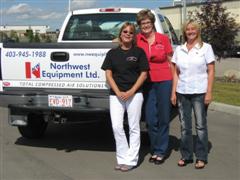 |
||
| Service Coordinators Cindy McKinnon, Patti Van der Meer, and Tracey Bruno of Northwest Equipment |
Please describe your business with “standard industry”.
We provide compressed air to all industries. We have veteran employees with long relationships with the woodworking shops, the bakeries, the food and drug industry, meat packing plants, blow molding plastics, and mining and lumber….to name a few industries using compressed air.
Our primary focus is to supply compressed air systems in Western Canada. We do supply special packages into other parts of Canada. In Quebec, for example, we do a lot of work with the aluminum foundry businesses. We fabricate special compressed air packages which can withstand their high ambient temperatures in the foundries. They install air compressors on the bridge cranes so the operators have utility air (like for impact wrenches to open the castings).
Another area we’ve had success is in HVAC packages on high-rise buildings. We’ve converted a lot of piston compressors to rotary vane air compressors. Each high-rise building probably has two to four 15-20 horsepower air compressors in their mechanical areas for control air. We have done a lot of retrofits with Variable Speed Drive rotary vane air compressors packaged with storage tanks. High-rise buildings are large energy consumers and the property management companies (like GWL and Oxford Properties) are focused on energy savings. We are seeing about 30 % energy savings with our packages.
Northwest Equipment also represents Tuthill Blowers across all of Canada. We have grown the business by four times since beginning to work with the technology. Our focus is on pneumatic conveying systems and wastewater treatment. We sell to OEM’s and have set up distributors across Canada.
Is there a push to save energy in Alberta?
Years ago, it was hard to talk in Alberta about energy savings. Factories only paid two cents a kWh! Five years ago, however, the industry was deregulated and energy costs are no longer subsidized and the blended rate is now at 9 cents per kWh! Industry is now very interested to hear about how we can optimize their compressed air systems to reduce energy costs.
The privately held utility companies do not currently offer any incentive programs with rebates for compressed air equipment. Trans-Alta, Alberta Energy, and Calpine are some of the utility companies we work with. Alberta does have a government-driven program to reduce carbon emissions. It is becoming very politically correct for industry to adopt greenhouse-friendly approaches. Most corporations, therefore, are very interested in our auditing programs.
 |
||
| A study estimated that 10% of the electrical energy generated in Alberta was used to run air compressors. |
Please describe your audit programs.
Northwest Equipment is conducting a significant volume of compressed air audits and implementing many energy-saving compressed air and blower projects. Most customers have had a hard time reviewing their system over the years. They have historically just bought more air compressors. While most applications in Alberta have smaller (less than 100 horsepower) systems, we find that the potential savings make the work worthwhile for our clients. Our top two methods to find energy savings are to:
Data-log a compressed air system for one week FREE OF CHARGE. We monitor kW consumption of the system and review opportunities with the customer. The most common solution is to replace older partially-loaded equipment with air compressors using the new Variable Speed Drives which can match energy consumption with demand.
Conduct a compressed air “inappropriate uses” audit. Common mis-applications for compressed air include blow-off applications in steel (high pressure air to cool down steel) and food processing applications. We collaborate successfully on many projects like this with Mr. Ed Ball of Process Air Solutions.
Thank you Northwest Equipment for your insights.
For more information please contact Mr. Sid Van der Meer, Northwest Equipment Ltd, email: sid@nwequipltd.com, tel: 01-403-945-1988, www.nwequipltd.com


